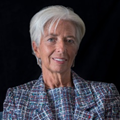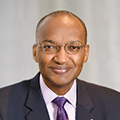Money and Payments in the Digital Age

IMF SEMINAR EVENT
DATE: April 10, 2019
DAY: Wednesday
2:00 PM - 3:00 PM
LOCATION: IMF HQ1 Atrium (HQ1-1-700)
Overview
Digitalization is reshaping economic activity, shrinking the role of cash and spurring new digital forms of money and payments. The panel—including representatives from central banks and the private sector (incumbents and disrupters)—will discuss the future of money and payments, focusing on the role of the private sector versus the central bank. Should the central bank focus on providing the supporting infrastructure and regulating the market? Or should it actively and directly provide payment services (such as by offering central bank digital currency)? What is the role of the state in ensuring trust in payment services? Does regulation favor banks or non-banks? Are private forms of money provided by non-banks substitutes or complements to banking services? Can the private sector build trust independently, such as through decentralized ledger technologies? What are the implications of these developments for financial intermediation, stability, consumer protection, and even privacy?Join the conversation via #DigitalPayments
Money and Payments in the Digital Age
SUMMARY
Broad range of opinions. Panelists offered diverging views on the future shape of the financial system. Allaire envisioned a decentralized system akin to the open internet, in which consumers across the globe were empowered to engage with other economic actors without intermediation. Other panelists were more reserved in their assessments, essentially viewing digital technologies such as cryptocurrencies and blockchains as complements to the current system.
Trust, not technology, is the real obstacle. The success of digital payment platforms such as Alipay in China or M-Pesa in Kenya suggests that mature technologies already exist. In fact, Allaire stated that a digital version of the SDR could be rolled out in 12-24 months from a technological standpoint. The key factor, however, was establishing trust in the new system, and there was considerable debate about what engenders trust among consumers. Allaire argued that cryptocurrencies and blockchains were inherently trustworthy because they were immune from human fallibility or corruption. Youngblood noted that consumers continued to trust large financial institutions, suggesting a path for offerings such as digital coins backed by traditional financial institutions. Cœuré noted that the future of the financial system would be shaped by a complex mix of market forces, social preferences, and political considerations.
Payments are just the beginning. The promise of technologies such as blockchain extend far beyond their application in digital payments. Allaire argued that they have the potential to fundamentally restructure society. Njoroge noted that digital transactions provided a wealth of embedded information about businesses, which could have broad implications for SMEs and consumers. He offered an anecdote about Kenyan female merchants’ early morning borrowing on lending platforms as an example of the social benefits of even relatively simple digital payment technologies.
Panelists
Moderator: Christine Lagarde
 Christine Lagarde is a French lawyer and politician who has been the Managing Director (MD) of the International Monetary Fund (IMF) since 5 July 2011. Previously, she held various, senior ministerial posts in the French government: she was Minister of Economic Affairs, Finance and Employment, Minister of Agriculture and Fishing and Minister of Trade in the government of Dominique de Villepin. An anti-trust and labour lawyer, Lagarde was the first female chair of major international law firm Baker &
McKenzie, between 1999 and 2004.
Christine Lagarde is a French lawyer and politician who has been the Managing Director (MD) of the International Monetary Fund (IMF) since 5 July 2011. Previously, she held various, senior ministerial posts in the French government: she was Minister of Economic Affairs, Finance and Employment, Minister of Agriculture and Fishing and Minister of Trade in the government of Dominique de Villepin. An anti-trust and labour lawyer, Lagarde was the first female chair of major international law firm Baker &
McKenzie, between 1999 and 2004.
Panelist: Jeremy Allaire

Jeremy Allaire is Co-Founder and CEO of Circle, a crypto finance company with products used by individuals and institutions around the world. Allaire has more than two decades of experience building and leading global internet software platforms and online service companies. He is also currently a member of the IMF’s High-Level Advisory Group on Finance and Technology. Before founding Circle, Allaire founded and served as CEO of Brightcove, an online service aimed at disrupting the traditional video distribution industry, which grew to become a global public company used by top media and marketing organizations in more than 60 countries. Prior to Brightcove, he was a technologist and entrepreneur-in-residence at General Catalyst, a Cambridge-based venture capital firm. He also co-founded Allaire Corporation, a pioneer in web publishing and online database technology, which he also took public and was later acquired by Macromedia where he served as CTO and helped make the Flash platform the most widely adopted software in the history of computing. Prior to his involvement in the internet industry, Allaire was a student of international political economy.
Panelist: Benoît Cœuré

Benoît Cœuré has been a member of the Executive Board of the European Central Bank since 2012. He is responsible for International and European Relations, Market Operations and the Oversight of Payment Systems. He is also the Chairman of the BIS Committee on Payments and Market Infrastructures. Previously, he served in various policy positions at the French Treasury, including Deputy Director General and Chief Economist from 2009-2011. Cœuré is a graduate of the École polytechnique in Paris. He holds an advanced degree in statistics and economic policy from the École nationale de la statistique et de l’administration économique (ENSAE) and a BA in Japanese. He is an affiliate professor at Sciences Po in Paris. He has authored articles and books on economic policy, the international monetary system and the economics of European integration.
Panelist: Patrick Njoroge

Patrick Njoroge is Governor of the Central Bank of Kenya (CBK). He joined the CBK after a 20-year career at the International Monetary Fund (IMF) in Washington, DC. Prior to his appointment as Governor, Njoroge was Advisor to the IMF Deputy Managing Director where his responsibilities included assisting in overseeing the IMF’s engagement with a large cross-section of IMF members. He has also served as Deputy Division Chief in the IMF’s Finance Department and IMF’s Mission Chief for the Commonwealth of Dominica.
Prior to the IMF, Njoroge worked as an economist at the Kenyan Ministry of Finance during 1993-1994 and as a planning officer at the Ministry of Planning in 1985-1987. He has a PhD in Economics from Yale University as well as an MA in Economics from the University of Nairobi. Njoroge’s professional and research interests lie in macroeconomics, economic policy, international finance, development economics, econometrics and monetary policy.
Panelist: Sarah Youngwood

Sarah Youngwood has been the Chief Financial Officer of Consumer & Community Banking at JPMorgan Chase since April 2016. Previously, Youngwood served as the head of Investor Relations for JPMorgan Chase. Youngwood also spent 14 years in the Financial Institutions Group within the firm's Investment Bank. In addition to experience managing relationships with specialty finance, hedge fund and asset management clients, she also has proven knowledge of the firm's businesses and products. She sits on the advisory board of the Wall Street Women’s Alliance, which is dedicated to creating a culture that enables women to advance to c-suite roles in the financial industry. Youngwood received a combined undergraduate and master's degree in finance from ESCP Europe and spent 6 months at Stanford Graduate School of Business. She lives in New York with her husband and three children.







